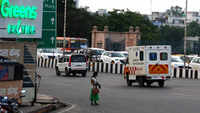
GUWAHATI/AIZAWL/SHILLONG: The loss of Jammu & Kashmir's special status and statehood in the course of a single day on Monday led to speculation about what lies in store for the northeast. With the exception of Meghalaya and Tripura, all northeastern states have been accorded special status under provisions of Article 371, with varying degrees of autonomy.
While Article 371A applies to Nagaland, Article 371B is for Assam, Article 371C for Manipur, Article 371G for Mizoram and Article 371H for Arunachal Pradesh. In addition, the Sixth Schedule of the Constitution sets forth what is considered an iron-clad safeguard against abrupt changes in the northeast.
The fear is most palpable in Nagaland and Mizoram, for which special constitutional provisions are the most extensive. Customary laws take precedence, land can't be transferred to non-indigenous people and civil and criminal justice follows only Naga or Mizo law. Any central law has to be ratified by the state assembly before being applicable to either state.
Attempts to deviate from the norms set out in Article 371A have not gone down well in Nagaland in the past. In November 2017, a proposal to extend 33% reservation for woman in urban local bodies - which goes against customary Naga laws - led to an upheaval that eventually led to a change of guard in the state.
Opposition Naga People's Front (NPF), which had to face the brunt of the anti-women's reservation protests in 2017, was confident the Centre would "never attempt" anything similar in Nagaland. "Our case is different. We got statehood through an agreement. We are confident the Centre would not dare to take the Jammu & Kashmir path in Nagaland. If the sentiments of the Naga people are hurt, the consequences will be severe," NPF spokesperson Achumbemo Kikon said.
Naga Hoho, the apex Naga tribal body which calls the shots in most matters social and political, called Monday's developments "undemocratic".
While Article 371A applies to Nagaland, Article 371B is for Assam, Article 371C for Manipur, Article 371G for Mizoram and Article 371H for Arunachal Pradesh. In addition, the Sixth Schedule of the Constitution sets forth what is considered an iron-clad safeguard against abrupt changes in the northeast.
The fear is most palpable in Nagaland and Mizoram, for which special constitutional provisions are the most extensive. Customary laws take precedence, land can't be transferred to non-indigenous people and civil and criminal justice follows only Naga or Mizo law. Any central law has to be ratified by the state assembly before being applicable to either state.
Attempts to deviate from the norms set out in Article 371A have not gone down well in Nagaland in the past. In November 2017, a proposal to extend 33% reservation for woman in urban local bodies - which goes against customary Naga laws - led to an upheaval that eventually led to a change of guard in the state.
Opposition Naga People's Front (NPF), which had to face the brunt of the anti-women's reservation protests in 2017, was confident the Centre would "never attempt" anything similar in Nagaland. "Our case is different. We got statehood through an agreement. We are confident the Centre would not dare to take the Jammu & Kashmir path in Nagaland. If the sentiments of the Naga people are hurt, the consequences will be severe," NPF spokesperson Achumbemo Kikon said.
Naga Hoho, the apex Naga tribal body which calls the shots in most matters social and political, called Monday's developments "undemocratic".
Trending Topics
LATEST VIDEOS
More from TOI
Navbharat Times
Featured Today in Travel
Quick Links
Lok Sabha Election Schedule 2019Lok Sabha Election NewsDelhi Capitals teamMI team 2019Rajasthan Royals 2019RCB team 2019Maharashtra Lok Sabha ConstituenciesBJP Candidate ListBJP List 2019 TamilnaduShiv Sena List 2019AP BJP List 2019Mamata BanerjeeBJP List 2019 MaharashtraPriyanka GandhiBJP List 2019 KarnatakaAMMK Candidate List 2019BJP List 2019 WBLok Sabha Elections in Tamil NaduBSP List 2019 UPNews in TamilLok Sabha Poll 2019Satta Matka 2018PM ModiMahagathbandhanNagpur BJP Candidate ListChandrababu NaiduTamil Nadu ElectionsUrmila MatondkarNews in TeluguMadras High CourtTejashwi YadavArvind KejriwalTejasvi SuryaPawan KalyanArvind KejriwalYogi AdityanathJaya PradaSatta King 2019Srinagar encounter
Get the app







